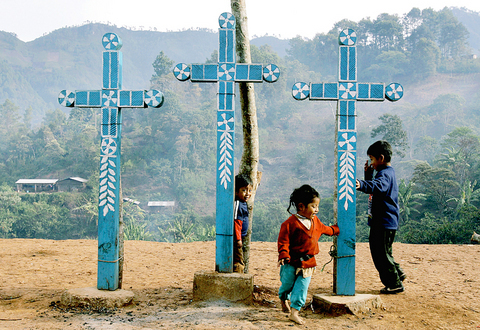Mexico's Zapatista rebels were emerging from their jungle hideout yesterday to launch a nationwide campaign tour billed as a pacifist alternative to this year's already contentious presidential race.
The beginning of the six-month tour was timed to coincide with the anniversary of a brief Zapatista uprising in the name of Indian rights, on New Year's Day 12 years ago. This time, however, the Zapatistas say they will not wield Kalashnikov rifles or declare war.
Instead, the ski mask-wearing, pipe-smoking Zapatista leader Subcomandante Marcos -- who is adopting a more civilian-sounding title, "Delegate Zero" -- has promised to build a nationalist leftist movement that will "shake this country up from below" during a visit to Mexico's 31 states.

PHOTO: AP
Marcos has also said the Zapatistas won't run for elected office or join Mexico's mainstream political process, which he describes as corrupt and out of touch with the people -- leaving some in Mexico confused about the rebels' intentions.
"What kind of movement is it going to be? That is the million-dollar question," said Miguel Alvarez, head of Serapaz, a pacifist group that helped with negotiations between the government and the Zapatistas. "I guess we'll just have to wait and see."
When the Zapatistas first stormed San Cristobal de las Casas on New Year's Day in 1994, they called for equal rights for Mexico's Indian minority and an end to one-party rule by the Institutional Revolutionary Party (PRI), which governed Mexico without interruption for most of the 20th century.
After the PRI's defeat in 2000 at the hands of current President Vicente Fox of the National Action Party, the rebels focused on building a network of Zapatista-run schools and medical clinics in dozens of Indian villages they control in Mexico's southernmost state of Chiapas.
The Zapatistas say this year's tour is a third phase of their revolution.
"A step forward in the struggle is only possible if we unite with other sections of society," the Zapatistas' command council said in a recent statement.

A feud has broken out between the top leaders of the far-right Alternative for Germany (AfD) party on whether to maintain close ties with Russia. The AfD leader Alice Weidel this week slammed planned visits to Russia by some party lawmakers, while coleader Tino Chrupalla voiced a defense of Russian President Vladimir Putin. The unusual split comes at a time when mainstream politicians have accused the anti-immigration AfD of acting as stooges for the Kremlin and even spying for Russia. The row has also erupted in a year in which the AfD is flying high, often polling above the record 20 percent it

Ecuadorans are today to vote on whether to allow the return of foreign military bases and the drafting of a new constitution that could give the country’s president more power. Voters are to decide on the presence of foreign military bases, which have been banned on Ecuadoran soil since 2008. A “yes” vote would likely bring the return of the US military to the Manta air base on the Pacific coast — once a hub for US anti-drug operations. Other questions concern ending public funding for political parties, reducing the number of lawmakers and creating an elected body that would

The latest batch from convicted sex offender Jeffrey Epstein’s e-mails illustrates the extraordinary scope of his contacts with powerful people, ranging from a top Trump adviser to Britain’s ex-prince Andrew. The US House of Representatives is expected to vote this week on trying to force release of evidence gathered on Epstein by law enforcement over the years — including the identities of the men suspected of participating in his alleged sex trafficking ring. However, a slew of e-mails released this week have already opened new windows to the extent of Epstein’s network. These include multiple references to US President Donald

CHARGES: The former president, who maintains his innocence, was sentenced to 27 years and three months in prison for a failed coup bid, as well as an assassination plot Far-right former Brazilian president Jair Bolsonaro is running out of options to avoid prison, after judges on Friday rejected his appeal against a 27-year sentence for a botched coup bid. Bolsonaro lost the 2022 elections and was convicted in September for his efforts to prevent Brazlian President Luiz Inacio Lula da Silva from taking power after the polls. Prosecutors said the scheme — which included plans to assassinate Lula and a top Brazilian Supreme Court judge — failed only due to a lack of support from military top brass. A panel of Supreme Court judges weighing Bolsonaro’s appeal all voted to uphold